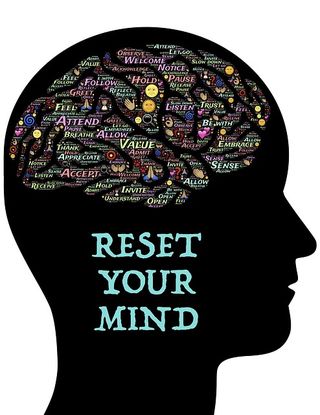Fear
Becoming a Mind Reader
Self-awareness can help manage negative thoughts.
Posted December 25, 2016

Consciousness is generally directed outwardly rather than inwardly. We look out at the passing scene in front of our eyes, taking little notice of the constant stream of thoughts shuffling through our mind. Nature has so equipped us to be alert to things happening around us, enabling us to avoid stepping into holes that lie ahead of us and being able to detect a lurking threat out of the corner of our eyes.
Self-consciousness, or awareness of our thinking selves, is a much more recent development in evolutionary history, occurring probably somewhere around 11:59 of the evolutionary clock face of human history. Yet living as we do in that sliver of evolutionary time known as modern civilization gives us the means and opportunity to think about thinking itself and to bring to awareness the panoply of thoughts, images, and memories that comprise the running account of our mental experience.
Moving targets are elusive, but they can also be caught. One way to catch passing thoughts is by inward focusing. Though our attention is typically directed outwardly to the world, we can hold a mirror to ourselves by engaging in a process of self-reflection. We can pull from the ether of consciousness the thoughts that run through our mind. There are the mundane thoughts of everyday life, of groceries to buy, errands to run, tasks to complete. But underlying the prosaic are deeper currents of repetitive thoughts that form a background of conscious experience and emerge into consciousness only when prodded by life events. These are the thoughts of failure and loss, of frustration and fear—thoughts which have a timeless quality because they are not anchored to any particular event but dredged up from the past like the thick mud at the ocean’s bottom.
When did we begin to think of ourselves as inadequate? Was it in high school? Grade school? When did we first begin to hate ourselves or fear that something terrible is always just around the corner? When did the negative voices in our head begin and who put them there?
Here are two ways of catching these offending thoughts:
(1) We may be able to ferret out intruding thoughts by reconstructing the scene of the crime. Pick a time when you were feeling sad, or angry, or troubled. What was going on that day that might have led you to feel this way? What were you bothered about? What was different about that particular day? What were you thinking? And importantly, what were you saying to yourself under your breath?
(2) Another way to track down thought triggers is by recreating in imagination a particular event or experience associated with a negative emotion. Try recalling the experience as though it were happening right now, in the moment. Can you bring yourself back to that event in your imagination? With your eyes closed, try to picture the event as vividly as possible in your mind’s eye. Open your mind to bring back the thoughts you may have experienced at this time.
What will you find in these mental excursions? Will you find offending thoughts that stamp down on you for being a worthless loser or that blow out of proportion the negative consequences of disappointing events?
Some thoughts are lost in the ephemera of time, as difficult to catch as a dream escaping consciousness as we awaken. No matter. Patterns reemerge. The next time you experience the same emotion, stop the action and reflect on what you were thinking.
Do we need to be prisoners of voices from the past? The voices of doubt and self-recrimination, of being a proverbial loser, a failure, a nothing, remain unexamined in our subconscious mind until prodded to the surface of awareness by present events— a disappointing grade in school, a poor evaluation at work, the lack of a partner on a Saturday night. The past becomes present and the present portends the future. Much of the work of therapy involves listening to the inner voices in our head, especially those mouthing words of self-contempt and then learning to challenge and replace them with more sensible thoughts.
Therapists abide by a fundamentally sound principle that people who are ignorant of (their own) history are bound to repeat it. Since the time of Freud, the belief that self-awareness or insight is needed for lasting change has been an abiding principle of the therapeutic process. Yet binding ourselves to this principle presents us with not one but two major challenges. First, how can we ever know with certainty whether any given interpretation is correct? And second, because change can only occur in the present, how does knowledge of the past affect changes we can make in the present?
The past is indeed prologue to the present. In the present, we can remake ourselves in ways that allow us to avoid the mistakes of the past. But understanding the past as prologue does not mean that change hinges on unearthing the past. Were that the case, we would be like ships in dry dock awaiting repairs needed before we could set sail again.
The metaphor of a broken mind, like that of a broken ship, does not square with our understanding of change. A more appropriate metaphor would be one of finding oneself headed down a wrong road and changing course. You needn’t fix anything other than the direction you are heading to make changes in your thoughts and behavior. You can change your thinking on the spot and on the fly. You can change distorted thoughts into rational alternatives and change undesirable behaviors into desirable behaviors.
The entries on this blog seek to make transparent the cognitions (thoughts, images, memories) that underlie our emotional states. Because change can only occur in the present, we must become more aware of how our thoughts and feelings intersect in the present. Becoming a mind reader can empower us to challenge and correct the disturbing distorted beliefs that lead to personal distress. So today, what disturbing thought can you snare and replace with a sensible alternative thought?
(c) 2016 Jeffrey Nevid




